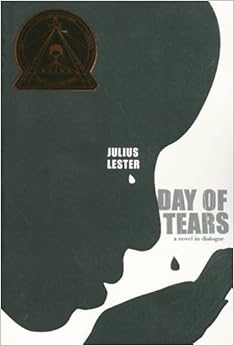Typically I don’t read American historical fiction. I had to do a lot of American history in school, and so I learned a dozen dozen times about the Revolutionary War and the Civil War and Reconstruction and the dreadful dusty Depression. I feel like I have already paid my dues where learning about those things are concerned. Louisiana history too. That project on the flood of 1927 was both tedious and depressing, so I have decided that Louisiana history and me are quits. I am a grown-up now, dammit, and that means I get to choose what countries and time periods I like the best (England in wartime, colonial India, modern Iran).
Also, reading about slavery and the Holocaust makes me sick to my stomach.
Also, it can be difficult to read books about particularly horrific episodes of history that don’t sound moralizing. Only because the people perpetrating the horrors are so indefensible that, you know, it’s hard to make them three-dimensional characters.
However, I do not want to be the person who pretends that bad things never happened. And I trust Ana, and when I first went to the public library, there weren’t that many books that I wanted, and I thought, You know what, Jenny? This moment in time, where you have a dearth of good books, this is the perfect time to read some books you do not necessarily think are your thing. So I checked out The Forest of Hands and Teeth, The Thief, and Day of Tears. You win some, you lose some.

American historical fiction is still not my thing, but Day of Tears was. It’s written in dialogue, like a play, though not quite a play, at the largest slave auction in American history. Over 400 men, women, and children were sold, and their former “owner” (this asshole here) made something like $300,000 from it, to pay off his gambling debts. In the parts of the book that are set at the auction itself, Lester intersperses the bits of dialogue with excerpts from the real register from the sale, which lists the people sold and the prices they fetched. The conceit of setting the book in dialogue works really well – you can almost hear the auctioneer’s voice, asking for bids on a little family. It’s surreal, the whole idea of auctioning off people, to the extent that it’s almost like reading a dream sequence, except it’s what really exactly happened.
Lester does a wonderful job with setting the scene. The slave auction was called “the weeping day” because it rained steady on for the whole two days that the auction lasted. Lester makes you feel it, the heavy rain and the humidity and the hundreds of people waiting to hear what would happen to them. At intervals there are chapters that feature dialogue from the characters several years on from the slave auction – Emma as an old woman, the slaveowners’ two daughters as adults, etc. – and it gives context and continuation to the story of the auction itself. Some of these are heartbreaking. One character talks about gaining his freedom after the war, and seeing all these freed slaves frantically trying to track down their family members who were sold away. It hurt my heart.
Which goes to show that you should not always decline to read books because they do not sound like your type of thing.
Do you have pet places and time periods that you like to read about? Do you have places and time periods you never ever want to read about?
Other reviews:
Anyone else?